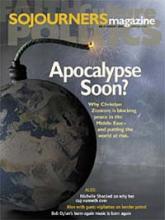It's morning in Iraq, or, depending on your time zone, afternoon. Then again, it could be late at night, and you're wondering where the day went. But back to our metaphor: A new day is dawning in the Middle East. Totalitarianism is over in Iraq, and the people will soon be experiencing the miracle of democracy and market-based capitalism, which, studies show, is mainly high cholesterol and credit card debt.
Mercifully, the tyrannical personality cult has been vanquished and one man's maniacal hold on the populace is over. We don't know where he is, or whether he's alive or dead. We only know that Geraldo Rivera won't be bothering anybody again.
But most important, the United States has gained a powerful new foothold in the Middle East, something neighboring countries have long been clamoring for, with the exception of Iran, Saudi Arabia, Turkey, Yemen, Pakistan, Egypt, Turkey, and Qumar (no, wait, that's a fictitious country on TV's West Wing). Now that the United States has claimed victory, grateful citizens of the region have only one question for the Bush administration: "How come where we live is called the Middle East and where you live is called the West? Maybe YOU guys are in the East, and we're in the West. I mean, the earth is round, right? Heck, if you start with Guam, the Arab states are, like, in Hollywood or something."
Good points all. (Yeah, right, like John Wayne movies would ever be called "Easterns." Hah!) But to understand Iraq, and why it was necessary for our government to make up stuff and pretend there was a real reason to invade, we have to look back a little further than last week's episode of Survivor. (I know it's hard, America, but try to focus.) Some historical reflection is necessary.
Read the Full Article
